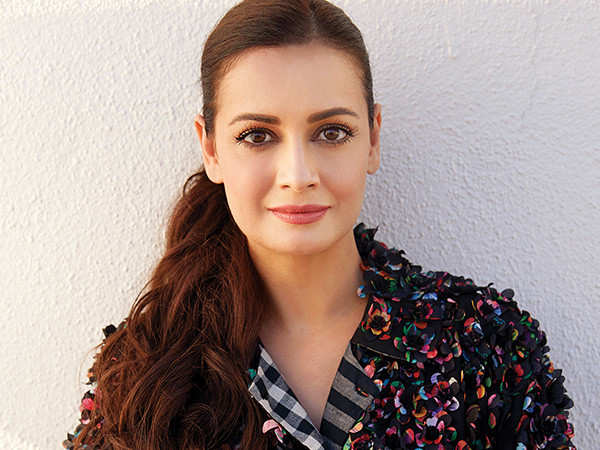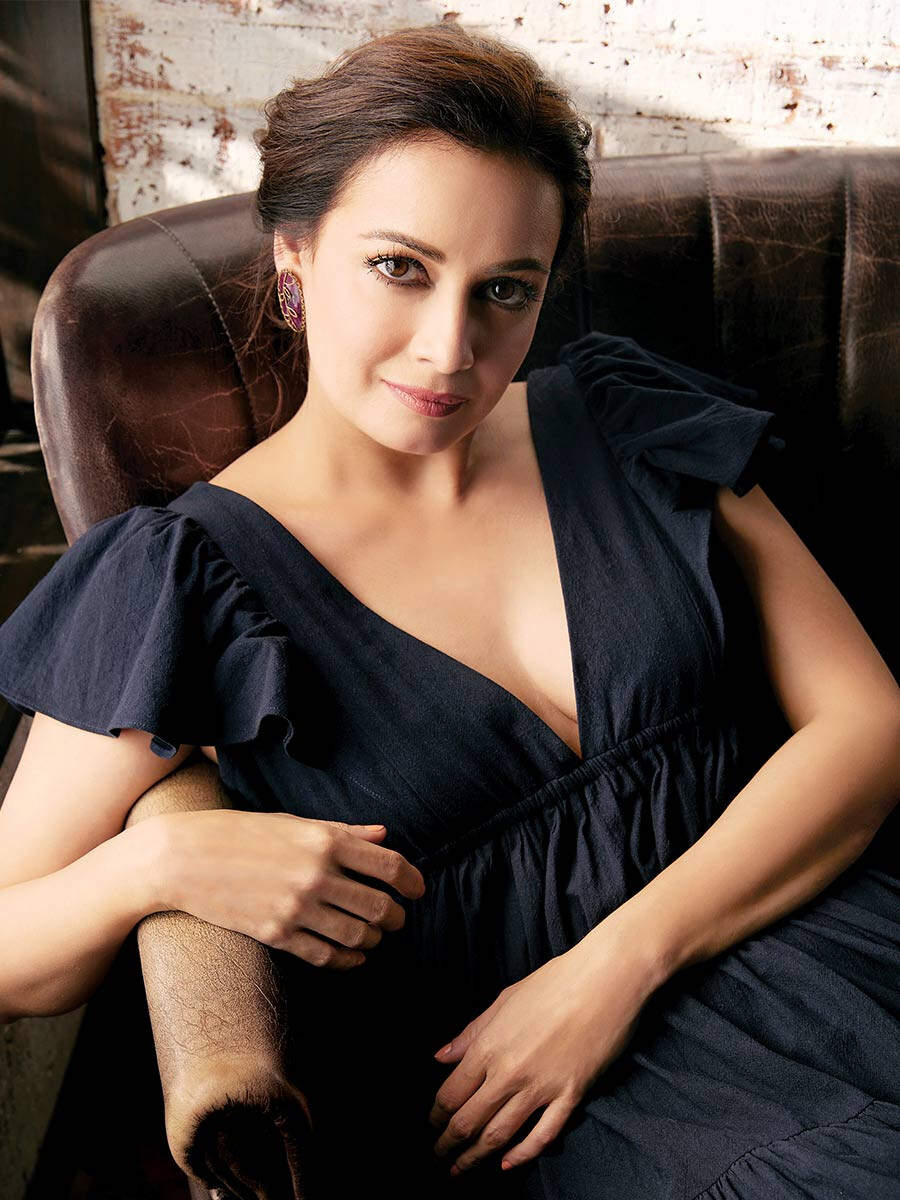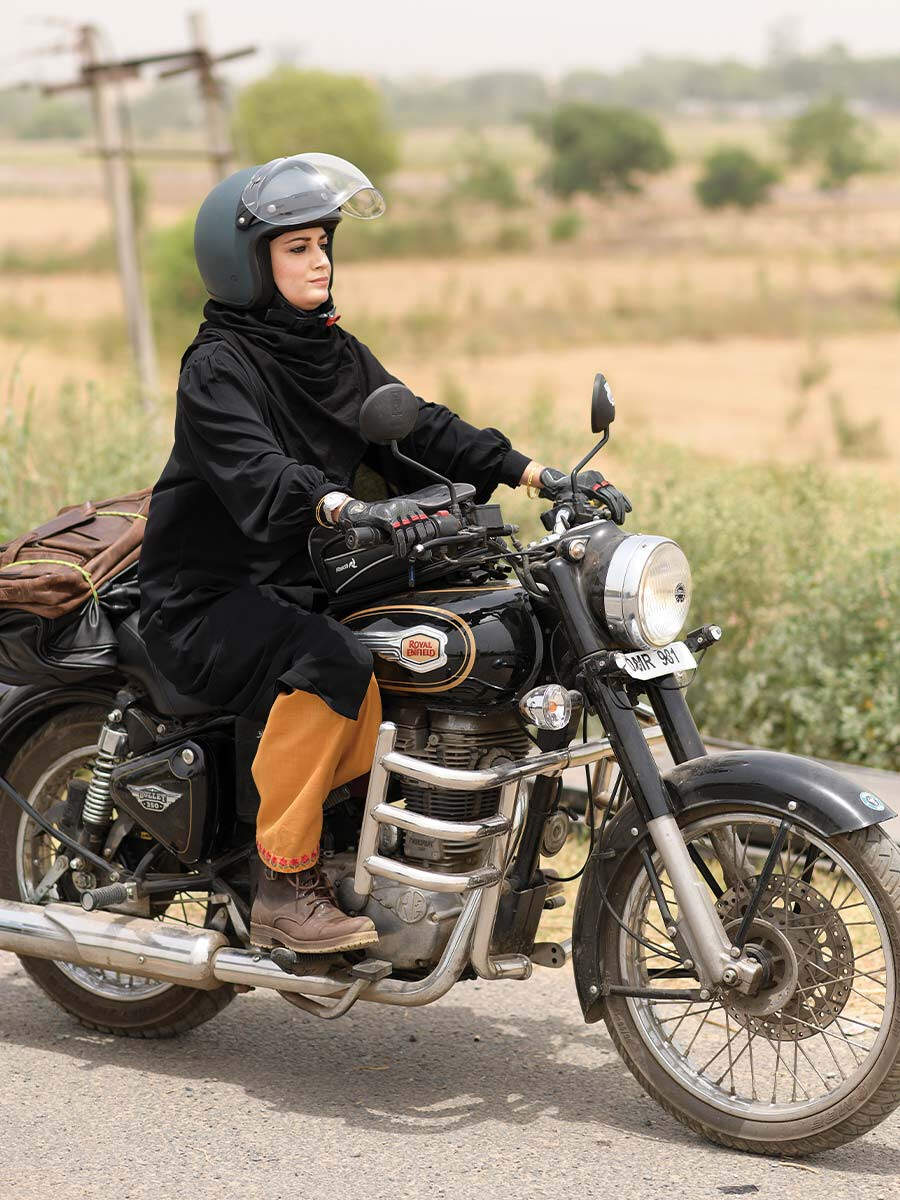

You’ve been known for a lot of experimental roles. What goes into that choice?
I’m at an age and stage of my life and career where I want to be a part of stories that can lead to insight and introspection. And possibly even lead to change. I’m really grateful for the parts that I’m getting to play. And I think Dhak Dhak is a gift that every artiste waits for. I was 40 when I signed the film. The fact that four women from entirely different age groups, unknown to each other, come together to take a journey on their bikes from Delhi to Khardung-La and then not only discover themselves but also each other and form a sisterhood. It’s been written by two sensitive men, Tarun Dudeja and Parijat Joshi. It has been produced by two sensitive producers, Pranjal Khandhdiya and Taapsee Pannu, who really care about making a difference.
Doing a road movie must have been challenging.
Oh yes! We were protected and we were in an insulated environment because everybody was watching out for us, even when we were riding on the roads and in traffic, despite that, the ride wasn’t easy. There are challenges there. Climate challenges, there are low oxygen levels, and there’s so much acclimatisation one has to do. I remember the first time we were on a slope and I had to balance the bike because we had to be stationary on the slope without letting it roll back. I suddenly became so aware of the weight of the bike—to be riding a 350 CC Bullet and managing its weight is not easy.
How did you go about learning to ride a bike for this film?
When I was a young girl, my dad used to be a rider. He had two Bullets so, one of my most special memories of my father in our time together was of him riding his bike and me sitting behind him, clutching him tight, feeling the wind in my face. I was just imagining and aspiring to be able to do the same someday. I didn’t do it for so many years because I think I was held back by fear. When the film came along and I read the script, I told myself I have to do this because not only is this a fantastic opportunity, but I get to fulfil a lifelong dream of riding a bike. When I finally grasped the basics and could ride on my own, it was liberating, empowering, and wonderful. I learnt to ride seven months after Avyaan was born. It’s never too late to learn something new and have a new experience in life.
Was there anything you discovered while going through the entire journey of the film?
Sometimes fear can be so physical and can incapacitate you, and it just takes that moment for you to get rid of it, but you need to confront it. You can’t allow it to just dwell in some part of your consciousness. You have to address it there. Riding a bike and feeling the beat of a bike that dhak dhak of the Bullet is much like life. When you are in sync with your heart and mind. And you’re in the moment, you can just go with the flow. And experience balance, beauty, and freedom.

The movie gave you the opportunity to experience the Himalayas in a unique way.
When you’re riding a bike in the Himalayas and you’re surrounded by the vastness of those mountains, the first thing you feel is the infinite space around you, and then you feel finite. You feel small. And then suddenly, it’s replaced with an infiniteness that you feel inside you. And that’s what the Himalayas do for you. I’ve always felt a special connection with the Himalayas, and I’ve always found myself altered and changed, and I come back a better, more humble person.
What does female friendship mean to you?
It’s fascinating to see the sense of community riders have in the way they stand by each other and the way they help each other. They’re women riders who were also doing stunt double work with us. They were doing a lot of the supervised shots while we were filming talking scenes. And they’re phenomenal women. The way they operate is fantastic. So one of the things that I remember feeling, and I know Ratna (Pathak Shah), Fatima (Sana Shaikh) and Sanjana (Sanghi) felt it too, is that women can be each other’s greatest allies and greatest strength. I draw so much courage from my sisters and all the girl pals in my life who have been so steady in their support and in their honesty. The fact that we can laugh at ourselves, laugh with each other, and be so raw. And these are so authentic and real with each other. You know, those are pure friendships. I have great male friends as well, but the kind of bond I share with my female friends—the unspoken understanding—there are so many emotions that you don’t have to explain to each other. I think while we’re navigating lives, it’s so important for us to hold each other and help each other.
What message do you want the viewers to take home from the film?
We’ve been seeing feminist voices that are angry, rebellious, provocative, abusive, or drunk. There’s been a certain tonality assigned to feminist pieces. The most refreshing thing about Dhak Dhak is that it does not tell something specific; it’s just a fine story. We’re just trying to mind our business, do our work, and get through life. It’s one of the most feminist films I’ve ever been a part of, but it’s not preachy.
What advice would you give to someone just starting out in the industry?
I always tell young actors that they should always seek to become their most authentic selves and stay connected to reality. It’s so important for you to keep evolving as a human being. And the best way to do that is by working with real people and doing things that are outside the film business. Everyday life, filmmaking and the process can be all-absorbing and can really disconnect you from reality. It’s so important to remain grounded and rooted.
You are passionate about sustainability.
I’ve been actively supporting environmental action for over two decades and animal wildlife conservation. I started to do that because I recognised that human health, progress, well-being, and equality was tied into climate action. The fact of the matter is that we are living through a time when we are experiencing a planetary crisis of climate change: air, water, soil, and food pollutions, and biodiversity loss, and it’s causing unforeseen misery and pain. We’re seeing it across the world. We’re seeing it within the country. The frequency of all of these things is intensifying, and what we feel most often as urban dwellers is understanding our patterns of consumption. What we eat, what we wear and what we use to clean our homes and wash our hair too. Everything has an impact on the natural world and therefore has an impact on our health and our lives. That is why I’ve been such a strong advocate for sustainability and sustainable living, and that, of course, includes sustainable clothing. India has historically understood the importance of treating nature with love and respect, and therefore our centuries-old traditions of dying, weaving, handloom, and handicraft embody that ethic. I’m always in sustainable clothing and now even for my films, all my directors and producers have allowed me to only wear sustainable clothing.
You also have your own production house; what kinds of stories are you looking to tell the world?
I want to tell stories with intentionality. I want to tell stories that help make a difference. We also kind of find a way to weave in the sustainable development goals and make sure that they become more accessible because some of the most compelling and powerful stories are of those people. We are making a difference, and that’s the kind of direction we want to go in.

SHOW COMMENTS